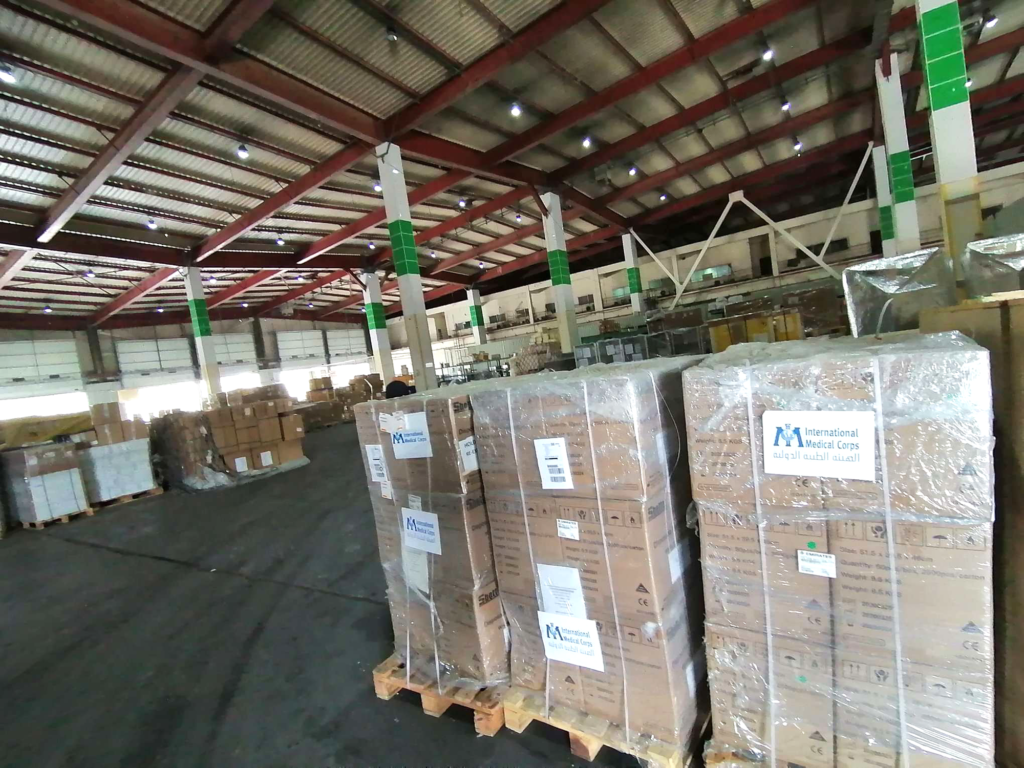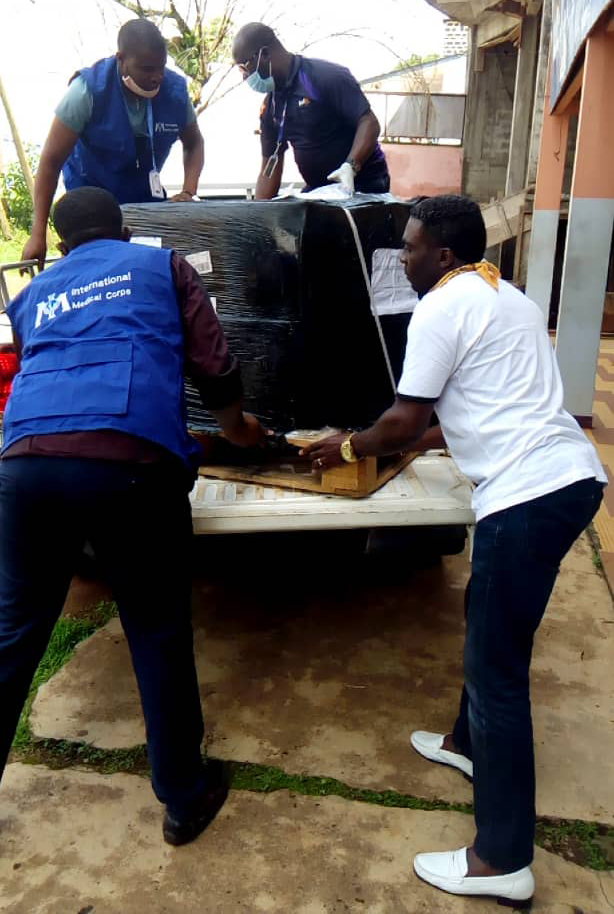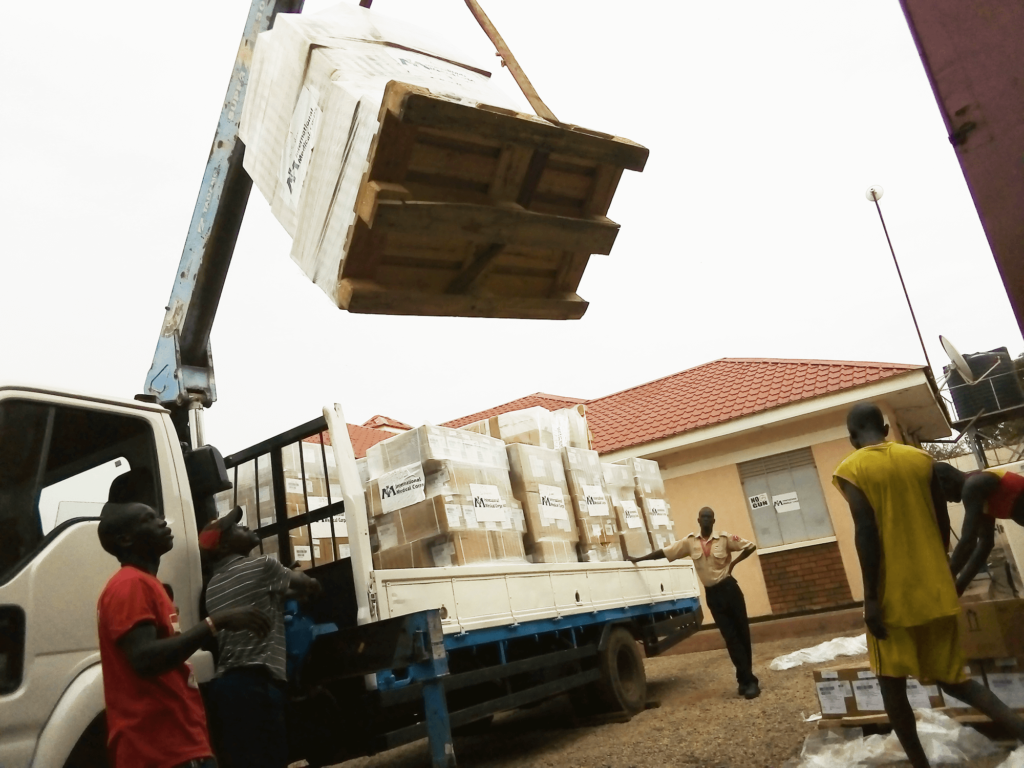As COVID-19 cases proliferated in early 2020 and parts of the world began to shut down, demand for personal protective equipment (PPE) exploded. Hospitals struggled to get the surgical masks, respirators, gloves and gowns that healthcare workers needed to safely do their jobs. Photos circulated online of doctors and nurses wearing trash bags, rather than isolation gowns, over their scrubs. Many clinicians were forced to reuse single-use medical masks and struggled to adequately sanitize them.
For an NGO like International Medical Corps, which provides healthcare services in nearly 30 countries around the world, the PPE shortage could have been devastating. With the onset of the pandemic, we were suddenly competing against governments, businesses, healthcare systems and individuals worldwide to obtain much-needed medical supplies. However, thanks to our skilled and experienced global procurement team, we have successfully navigated the challenging PPE landscape by taking immediate action, relying on partners and seeking out non-traditional sources to get the necessary supplies and deliver them where they’re needed most.
Extraordinary Challenges
Though International Medical Corps’ global procurement team had proactively sourced medical supplies during the first months of 2020—while COVID-19 was still largely contained—PPE became nearly impossible to procure through traditional channels once the virus began to ravage Europe and the US in the early spring.
“The lesson we learned from our response to the 2014 Ebola epidemic was that this outbreak was about to expand into something much bigger,” says Nikola Usenovic, Head of Global Procurement. “So, we went to non-traditional suppliers on the market. In the first two weeks of our research, we contacted more than 500 manufacturers and wholesalers in 27 countries. We left no stone unturned to find what we needed.”
The quest was very much a team effort. “Throughout the organization, people were helping us find sources. Everybody was offering to help screen the leads we received,” says Marin Tomas, Senior Advisor for Logistics and Supply Chain Management. “Our global procurement team followed up on every single lead.”

Despite such extensive legwork, the team ran into multiple obstacles. A majority of suppliers never replied to International Medical Corps’ queries, while many of those that did respond inflated their prices drastically, provided inaccurate information about their products or tried to sell substandard or counterfeit products. Still others prioritized their regular customers and declined to work with any new clients because of their inability to fulfill additional demand. When International Medical Corps was able to place an order, suppliers sometimes canceled to accommodate new customers offering to pay much higher prices.
Further complicating matters, in the early days of the pandemic the European Union, China and India imposed temporary bans on the export of PPE items and pharmaceuticals. China, normally a prime source of PPE, repeatedly changed its export regulations, making it hard for suppliers and customers to keep up. As a result, many orders were delayed or canceled.
Transporting PPE was another issue altogether: many cargo companies had ceased operation, and fewer passenger planes in the air meant that cargo capacity was greatly reduced—sending costs soaring. As countries closed their borders and went into lockdown, airport and customs operations were limited or suspended. This further reduced our staff’s capacity to process export or import files, causing substantial delivery delays.
Still, within a matter of weeks, the pursuit of every lead began to pay off, and the team was able to secure shipments of critical PPE items right off the production line. To date, the global procurement team, together with the IMC country teams, has prepositioned or delivered more than 20.1 million pieces of PPE, including surgical masks, gloves, respirators, face shields and protective gowns and aprons. These supplies have been distributed to 900 primary health facilities, 166 hospitals, 32 COVID-19 treatment centers and 44 mobile medical units worldwide.
Cooperation Is Key
Along with the procurement team’s hard work and tenacity, another major factor contributed to International Medical Corps’ PPE procurement success: our strong partnerships with other organizations. Despite unprecedented competition for supplies in the PPE market, cooperation with United Nations agencies and other NGOs has proved highly effective.

Since the beginning of the pandemic, International Medical Corps’ procurement team has known that prepositioning supplies would be critical because it would enable bulk purchases (many wholesalers only accept high-quantity minimum orders) and create a continuous flow of PPE to our country programs. The United Nations Humanitarian Response Depot (UNHRD) provided International Medical Corps with 430 cubic meters of warehouse space in Dubai—an optimal geographic location, with direct air access to most of our programs. As an existing UN hub, the depot was connected to the World Food Programme’s free-to-user shipping services, which lets International Medical Corps ship PPE to its country programs upon request. Working with a third-party logistics company, we set up a similar hub in Los Angeles and continue to keep contingency stock in both locations.
International Medical Corps became a taskforce member of the UN-led COVID-19 Supply Chain System (CSCS), which pursues an approach to sourcing, procurement and delivery that enables governments, UN agencies and NGOs to receive fair allocations of PPE supplies. We also are part of the Inter-Agency Procurement Group, made up of more than 30 international NGOs that share information on PPE procurement, quality concerns and freight options.
“Our success has been a matter of maintaining constant surveillance of the market and knocking on all possible doors, while remaining flexible and developing new methodologies, using all the possible opportunities that were made available to us through our traditional vendors, leveraging the UN procurement consortia and engaging with large commercial wholesalers and manufacturers all over the world,” explains Sebastien Cazenave, senior director of global logistics and supply chain.
Preparing for the Future
As the world continues to adjust to the unique challenges presented by the pandemic, the arduous process of procuring PPE has eased somewhat. International Medical Corps has managed to build a stockpile of PPE items for country programs, leaving them with enough respirators, masks, gloves, gowns and other essential items to last four to six months. We also have conducted local market screening to identify reasonably priced, good-quality PPE items, so that quick sourcing can take place if there is an urgent need to replenish stock.
“Now my biggest concern is the unpredictability of the next waves, when three or four months’ stock could actually become three or four weeks’ stock,” says Cazenave. “The burn rate is always a variable that we can only anticipate and adjust to as the pandemic evolves.”
Though the initial wave caught the world off guard, Cazenave believes that PPE manufacturers and vendors—not to mention the UN, governments and NGOs—are in a much better position today. “We are now aware of the challenges, and the supply chain has been restored and is better able to cope with the demand,” he explains.
As International Medical Corps prepares for COVID-19 vaccine distribution, staff members are now training to manage the large-scale vaccine supply chain. This crucial education will help them meet the challenges of receiving vaccines and assisting under-resourced healthcare systems around the world. With this new training under its belt—coupled with the lessons of 2020—the team is confidently pivoting to the new logistical challenges of 2021.
“The competitive advantage of International Medical Corps is that we’ve been able to manage the global coordination of PPE supplies during a pandemic, while continuing to supply our regular country programs,” Cazenave says. “I’m very proud of our teams for what they have done. COVID-19 vaccination is our next challenge, and I know International Medical Corps is ready to take it up.”
